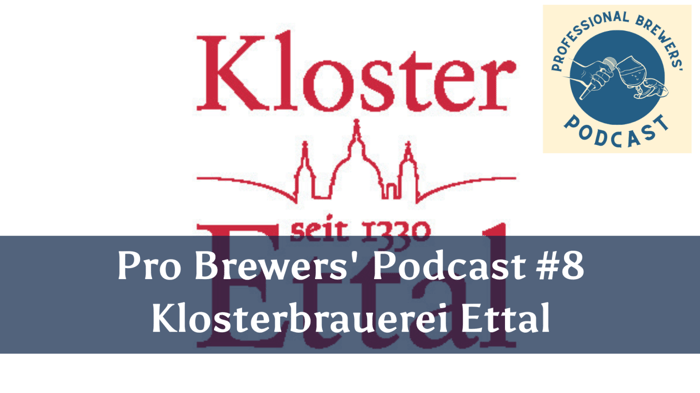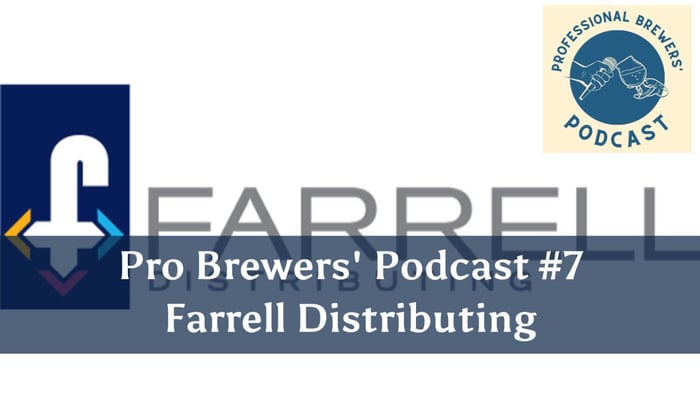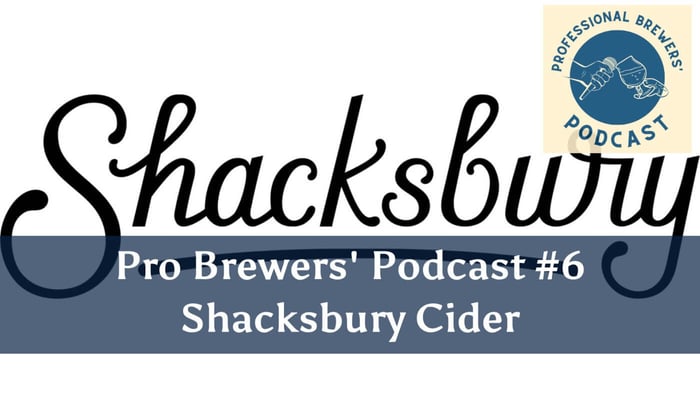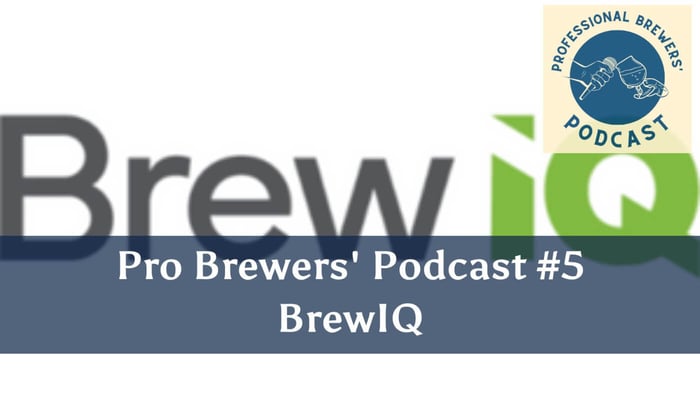On this week’s show, I talk to Sam Howard, the wandering brewer who's currently working at Klosterbrauerei Ettal in Bavaria.
We follow Sam's journey from Connecticut to Vermont, then off to Hawaii, over to Berlin, and, at last, to a Monastery in Bavaria.
If your dream is to travel the world and drink great beer, Sam’s story will be incredibly inspiring. We cover everything from brewing in a Hawaiian valley that has no power or running water to the impact of the Reinheitsgebot on brewpubs in Berlin.
You do not want to miss this episode!
From the Episode
Learn More about Klosterbrauerei Ettal

About the Podcast
Welcome to the Professional Brewers Podcast where we interview brewers, brewery owners, and other folks in the industry to take a deep dive into what it takes to have a successful brewing operation.
This show is for brewers of all kinds: folks considering going pro, professional brewers, people who want to look behind the scenes of their favorite breweries, or merely the brewcurious.
Whether you’re hanging over a fifty-barrel mash tun while you listen to this or you’re just starting your professional brewing journey, we hope this show helps you become a better, more profitable, happier brewer.
New episodes every Wednesday!
Transcript
Welcome to the Professional Brewers Podcast, sponsored by Groennfell Meadery and hosted by me, Ricky the Meadmaker. This show is for brewers of all kinds, anyone looking to get into brewing professionally, folks who want to peek behind the scenes at their favorite brewery or merely the brew curious. Whether you're an old hand in the industry or you're just starting your professional brewing journey, we hope this show helps you become a better, more profitable, happier brewer.
If you find this show helpful or just enjoy listening to my dulcet tones, please consider supporting us at patreon.com/professionalbrewerspodcast. There's also exclusive content over there as well as the opportunity to ask questions of upcoming guests.
On this week's show, I talked to Sam Howard, the wandering brewer. We follow his journey from Connecticut to Vermont, off to Hawaii, over to Berlin, and at last to a monastery in Bavaria. If your dreams to travel the world and drink great beer, Sam's story will be incredibly inspiring. We cover everything from brewing in a Hawaiian valley that has no power or running water to the impact of the right heights, but on brew pubs in Berlin, you do not want to miss this episode.
And now without further ado, Sam from Klosterbrauerei Ettal. Sam Howard, welcome to the show.
Thanks, Ricky.
So we're gonna start where we always start. Tell me a little about your role at the brewery about your brewery, how big it is, what you focus on and anything else that you think makes it interesting.
Yeah, sure. My role at the brewery is brewer. I've made my brewmaster certificate. But at the time that I started the brewery, I was still a brewer. So my role hasn't changed in that time. Brewery itself is called Klosterbrauerei Ettal, which is a monastic brewery in the town of et al. in southern Germany. It's what you would call a middle sized brewery. I think that's quite relative, actually, depends who you're asking what middle size is. But here in Germany, and especially Bavaria, middle size, our brewery is 6000 hectoliters in the year. And for all the American brewers, 6000 hectoliters is 5113 barrels per year. So this would be considered a middle sized brewery, but just at the beginning of middle size, which I think actually for a lot of Americans would be considered almost on the larger size, but it's still still somewhere in the middle. Certainly not a Gasthausbrauerei brewpub, right? Yep. Yep. So certainly not a brewpub size, a little bit bigger, but also nowhere near a macro brewery. So somewhere kind of in the sweet spot, what I would consider.
And how did you end up there? I think Google Maps is the I can thank Google Maps for finding this Klosterbrauerei Ettal, because I was sitting in class one day during the master school. This was in Munich at an academy called Dumens Academy. And I was sitting in school one day, and I think that the topic just wasn't really interesting me too much. And I started googling breweries because I knew the studies would be over in a few months. And so we needed to start applying to breweries. And so I went on to Google Maps, I zoomed in on the Bavarian Alps, and I typed in brewery or brauerei. And it came up with a couple results. And I sent my CV to these breweries. And quite quickly, I think within the afternoon, I had a call from one of the breweries I applied to and they said, Hey, if you can come down on the weekend, we'd be happy to interview you. Of course, I spoke in German, not in English. And I went on that weekend, they interviewed me and about one or two weeks later, they said, Hey, we'd like to offer you the job. And I was glad to take it.
That's amazing. So tell me about your whole path. You're not from Germany originally. How did you? Where did you start? Tell you probably have the most interesting rambling brewer story of anyone that I know.
Well, you better than anyone know, where I began, I think professionally, at least, I began with you at Groennfell, at the meadery professionally. Do you want to take a few steps back? I was gonna say Sam was actually our first intern. Is that true? Yeah, you were our very first intern. It was almost it would have been nine years ago, right?
Years ago, 2000 either 2014 or 15. I want to say, yeah.
So very, very beginning and was when I was 17. And I was like, was when I was 17. And I looked out into the garden, the field at my parents house, and I saw a bunch of dandelions. And I was curious what you could do with dandelions, what you could make with that. And I thought maybe you could make wine. So I picked some dandelions, made a dandelion wine following the recipe that I found online, and it was terrible, it was not good at all. And that's where I began.
Well, it's just the perfect start to a brewer story. Right? Like, it's never a straight line. It's never just, oh, I had this interest and then I went to school and then I got a job. It's always a meandering, convoluted, messy path. And that's what makes it interesting.
Yeah, absolutely. I mean, I think a lot of people probably start with a homebrew that isn't very good. I think that's a pretty common path. For a lot of brewers.
So from that dandelion wine experience, how did that eventually lead you to Groennfell Meadery and then take us on the rest of your journey? Well, it wasn't until I started brewing, really, in Germany that I thought back to the idea of making alcoholic beverages that aren't from just the usual ingredients that we see here in Germany. So I think what's been really interesting to me is I've been able to see the perspective of what people expect and want to drink in Germany, and in the south of Germany, and Bavaria specifically, versus what I've learned in the places that I've been, and I've lived in the US. I've lived in Hawaii, I lived in Berlin for a couple years, and now I live here in Bavaria. And so I have a pretty good grasp on the US and what's expected there and what's common to drink there, and I have a pretty good idea of what's common to drink here and what people are interested in drinking here. And I can see the difference in the markets. And that's always that's interested me and fascinated me. So I think that maybe one of the biggest influences that I've had from the places that I've been has been the idea that you can make alcoholic beverages from whatever you like. And that is what's interesting to me. And that was something that I learned with you guys, when we started Groennfell together, because you guys were making mead and I had never seen mead before. I had no idea what mead was. I had no idea that you could make mead and I had no idea how it would turn out. And you guys were pretty successful, I thought, especially for not knowing what you're doing.
It turned out pretty good.
Yeah, yeah, it turned out great. So that that inspired me a lot. And I think I had also done some work at a winery as a volunteer in the US, so I had a little bit of experience with the fermentation of fruit. And I think I did that in between you and when I started brewing, which was also interesting, because I think that the person who makes alcoholic beverages, whether it's beer or wine, they'll look at the fermentation process very differently. So when I first started at the winery, I thought to myself, well, the fermentation is just easy. You throw the yeast and you throw the sugar in there and you walk away. And it does its thing. But then you go to a brewery and you learn about brewing and it's all the little details that really matter. So it's not like you throw the yeast in and you walk away and then it's fine. No, you throw the yeast in and then you have to make sure that the temperature is right and that the yeast is happy and that it has enough oxygen. And then you have to make sure that you're doing this at the right times in the fermentation and that the yeast is flocculating correctly and doing all these little things. And so then when I went back to the winery, I thought to myself, well, this is all this little stuff is happening, but nobody knows about it, right?
The winemaker didn't know anything about it, they weren't looking for any of these things. And so I think that probably if you're if you're going to a commercial winery, or a commercial brewery, the brewery is going to look at the fermentation and know about all these little things that can go wrong. And they're going to be looking for these things. Whereas I think that wineries probably don't, I think that that was probably one of the interesting things to me. And that's probably because winemaking has been around for so long. And there are so many winemakers that are out there that have been doing this for so long. And they've kind of figured it out. Whereas breweries, they still have to figure it out. And especially craft breweries, they're just trying to figure out how this whole thing works. Whereas a winery has already figured it out, right? And so you have these people who have been doing it for hundreds and hundreds of years, and they just do it. But now you have these craft brewers, and they have to take all these things into account. So it's probably different, the way that you're looking at the fermentation process.
Yeah, that's a really interesting observation because, as you said, brewing has gone through this rapid evolution, especially on the craft side. And I think the focus on those details is a big part of that. It's not just about making the alcohol, it's about making it taste a certain way and achieving consistency. And that's where all these details come into play.
Yeah, absolutely. And I think that's maybe where the problem is with brewing in Germany, and especially in Bavaria, because they have this tradition, and they have this history that is so strong. And so they've been doing this for so long, and they don't want to change anything, right? So they don't want to add any extra ingredients to the beer. They don't want to do anything that is going to change the beer, because they have this tradition that they want to keep. But I think that it's important that they also keep the beer interesting. Because if they don't keep the beer interesting, then nobody's gonna drink it, right? Nobody's going to buy it. And so I think that it's important that these breweries, even if they are traditional, and they've been doing this for a really long time, that they need to figure out how to keep the beer interesting, and how to keep it modern. Because otherwise, nobody's gonna want to buy it.
Absolutely. And I think that's a challenge that a lot of traditional breweries face, not just in Germany, but all around the world. How do you maintain that tradition and that history while also adapting to the changing tastes and preferences of consumers?
Yeah, exactly. And that's probably one of the reasons why I came here, actually, to Ettal. Because I wanted to learn from these guys. I wanted to learn from the old school. I wanted to see how they do things. And they make great beer. They make really good beer. And so I wanted to see how they do it and learn from them and then take that back to the US and to other places. And I think that that's one of the things that I've learned from traveling is you go to these different places, you see how they do things, and then you take that back with you. And I think that's been one of the biggest benefits of traveling for me.
Absolutely. It's like adding tools to your toolbox, right? You're collecting all these different techniques and perspectives, and then you can apply them in different ways.
Yeah, absolutely. And you're also building relationships, right? You're building relationships with people in the industry, and that's always a good thing.
Definitely. And speaking of relationships, I think that's a good segue to your journey from Groennfell Meadery to where you are now. So tell us about how that transition happened. How did you end up in Germany working at Klosterbrauerei Ettal?
So I think that, as I mentioned before, I was sitting in school one day, and I was thinking about what I was gonna do after school. And I thought about brewing, and I thought about maybe starting my own brewery someday. And I thought about where I wanted to be in the world. And I wanted to be in Germany. And I think that that's probably because I had been to Germany before. I had been here as an exchange student in high school. And I just loved it here. I loved the culture. I loved the beer. I loved everything about it. And I thought to myself, well, maybe I could start a brewery in Germany. And I think that's probably where the idea came from. And so then I looked for places where I could work, and I found this place in Ettal. And I thought to myself, well, I think this could be a great place to learn from the old school and then take that back to the US someday.
So it was a conscious decision to seek out this traditional experience to learn from the roots of brewing, in a way.
Yeah, exactly. And I think that it's a great place to do that. Because there's so much history here. And I think that's one of the things that I've learned is that you can learn so much from history. And you can learn so much from the people who have been doing this for a really long time. And you can take that with you and learn from that.
Absolutely. And I think that's a philosophy that can apply to any field, really. Learning from the history and the traditions and then building upon that.
Yeah, absolutely. And I think that's why I also like brewing, because you can always learn something new. There's always something to learn. There's always something to experiment with. And I think that that's what makes brewing so interesting and so fun.
Definitely. It's a never-ending journey of exploration and experimentation.
Yeah, absolutely. And I think that's also what's important about brewing is that you need to have fun with it. Because if you're not having fun, then why are you doing it, right?
Exactly. And I think that's a great note to end on. Sam, thank you so much for joining us today and sharing your journey, your insights, and your perspective on brewing. It's been a pleasure having you on the Professional Brewers Podcast.
Thanks, Ricky. It's been a pleasure being here.
And to our listeners, thank you for tuning in to another episode of the Professional Brewers Podcast. If you enjoyed this episode, don't forget to support us on patreon.com/professionalbrewerspodcast and stay tuned for more exciting interviews and insights from the world of professional brewing. Cheers!




